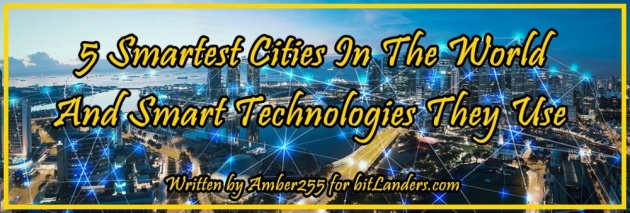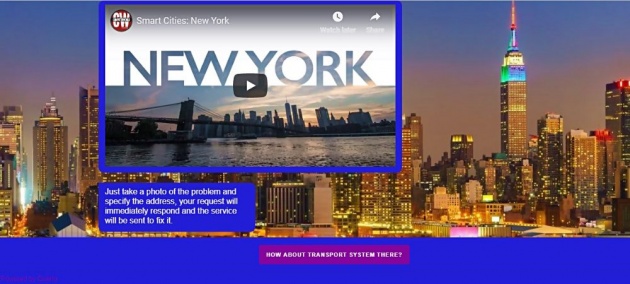
C-Blog: 5 Smartest Cities In The World And Smart Technologies They Use - Photo credit: dalkia, edition by amber255 via bitLanders
Some time ago, the term smart city was not at all commonly used, but now we hear it more often. Smart city means a megacity, which combines smart technologies to improve the quality of life of the population, reduce the negative impact on the environment, the active use of alternative energy sources and a decrease in energy demand.
The first smart city in history can be considered the Spanish resort Santander. In 2011, as part of the SmartSantander project, 15,000 sensors were installed in the central quarters of this town; they equipped a broadcasting network and a platform for information processing. The sensors reported air pollution, traffic, and vacancies in parking lots, garbage containers, etc. In total, there were about a dozen high-tech projects with a budget of 60 million euros. The municipality used the received information to save street lighting, improved collection of garbage, and loosen roads.
I read some articles that the ideas of the smart city controlled by artificial intelligence have been already tried in China and other Asia countries. I will not guess how much these cities were really managed by artificial intelligence. To manage energy and transport by AI in the city is one thing, and absolutely another thing is to manage the entire city.
Today, smart cities stopped being just a dream of the distant future. Some cities already have the characteristics of a smart city: smart waste collection, intelligent lighting and parking, crime prediction mechanisms, and other modern ICT-based solutions. It is predicted that smart cities will soon manage electricity, material flows, logistics, and even traffic.
Credit: Amber255 via bitlanders
If smart cities are interesting to you, I think you should look at what is happening in China because it has the ambition to lead the way in artificial intelligence. For radical urban experiments, a totalitarian system is very suitable, as it can ignore property rights and privacy.
If a state can decide to build a completely new city that will be balanced from the beginning with centralized management, and if it can decide for future residents how much and what data will be collected about them, then maybe a city that is almost completely managed by artificial intelligence is possible. But I think this almost will still stay.
The smart city's definition is not universal, and it is gradually changing. Now we know that this is not just a city full of smart sensors. Every city needs technology, but sensors should interconnect and exchange information. But even that is not enough. The ability to exchange data must have a positive impact on citizens, promote innovation and better quality of community life, and involve urban citizens in urban governance.
Today, such a city would be considered smart. Such as Amsterdam, Stockholm, Dubai, New York, and many others call themselves smart cities. There are cities that are being built in an empty spot right away, presenting themselves as smart. Although it is more often more like marketing than creating a vibrant city.
We hardly imagine any city now without technology.
The city needs technology to manage physical infrastructure more efficiently, as well as the tools to involve residents in decision-making. In addition, such a city must constantly improve and change to better meet the needs of the townspeople and be able to compete with other cities.
The official goals of the smart city are borrowed from sustainable city concepts, but the solution proposed is different. With the help of information and communication technologies, the smart city offers a solution to the economic, social, environmental, and other urban problems.
10 Smartest Cities In The World - Video credit: youtube
In this way, we want to improve living conditions and foster the environment. With such a smart city concept, most would probably agree. Skepticism is getting stronger when it comes to talking specific technological solutions that should meet these goals, as sometimes these solutions are similar to the novel's storyline.
For example, China is already experimenting with people rating; a social credit score is being tested. A resident can get penalty points that make him not only embarrassed but also limit his access to some transport and education services. Combining such an idea with a full city of sensors, we would not get a smart city but a prison.
So it is not only technology that matters, but also for what purposes it is used, what type of city they are trying to form. Let's look at five smart cities, each of which is unique in their concept and look at technologies they use:
Singapore, London, New York, Barcelona, and Copenhagen.
Chat with me on Querlo Chat about these five smart cities (click on the title and open chat in a full screen: 5 Smartest Cities In The World And Smart Technologies They Use):
It seems to me that it is important that infrastructures should not only be able to create connects but also stop them. I do not know if you heard the legend about Robert Moses' bridges in Long Island, created in the 1930s. According to one version, these crossing stone bridges were deliberately designed lower so that heavy commercial vehicles could not travel on the road. The road had to serve cars. Another version says that in this way, Moses created a barrier to use for the poor, mostly African-Americans, who at that time rarely had their own cars and most used public transport - buses.
I am not sure what the real goals were, but this story could be remembered for sensor networks and smart technologies. Depending on how we use them, the same technologies can connect citizens or close them in personal information bubbles
If the city is changing, the townspeople and their needs change, the architecture is changing as well. However, at least it is difficult to say how these changes will occur. I can imagine that if the city is full of sensors and smart cars, it might not need traffic lights, pedestrian crossings, and even street curbs.
Also, the creators may have to reconsider what the public spaces of the city are; maybe the streets can melt, and no longer have boundaries.

C-Blog: 5 Smartest Cities In The World And Smart Technologies They Use - Photo credit: Amber255 via querlo
Technologies are already changing urban development projects.
Home delivery changes the need to have a supermarket near the home, maybe it can be further and visited less frequent, and near home, will be enough to have a small store. But the physical body of the city is rather inert; it is changing very slowly, so the biggest changes will probably not happen because of how buildings or streets look, but how people use them.
Summarizing we can say that it is obvious, such a future of the cities is inevitable, and the cities that will successfully carry out the new technologies for comfort in the city will win.
Perhaps the city of the future will be the place where technology will be the least eye-catching, but because of it, life there will be comfortable, safe, and cozy - there will be no doubts would you have to leave a city going to live in the rural area.
***********************************************************************************
****************************************************************
******************************************
I invite you to participate in Bitlanders AI-themed Blogging and create your own AI-themed blogs and C-blogs on artificial intelligence theme:
bitLanders AI-themed blogging
After the successful launch of "The bitLanders C-blogging", conversational AI blogging by Querlo powered by IBM Watson and Microsoft Azure. bitLanders continues to support its joint venture Querlo. We believe in our mission to promote our future - Artificial Intelligence (AI) - and build AI conversations via blogging, here we are to introduce "bitLanders AI-themed blogging!".Credit: quote from bitLanders
Always welcome back to check more Querlo Chat blogs on AI theme.
***************************************************************************************************
Thank you for stopping by and reading my blog.
2019, All Rights Reserved.
You are very welcome to join Bitlanders and share your valuable knowledge and opinion.
***************************************************************************************************



